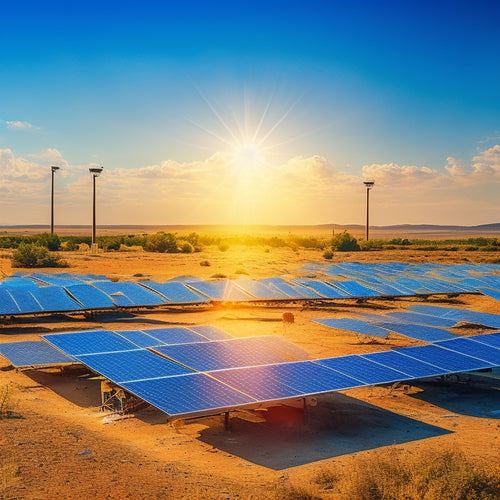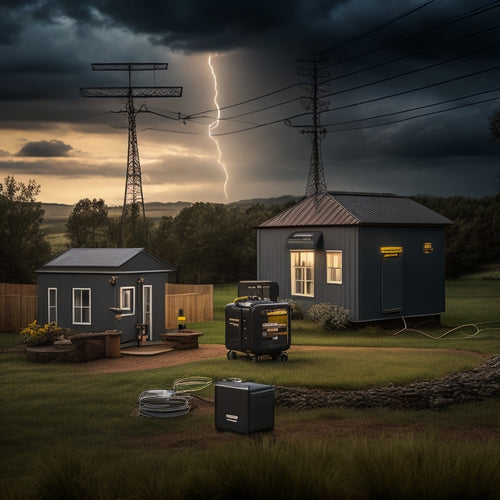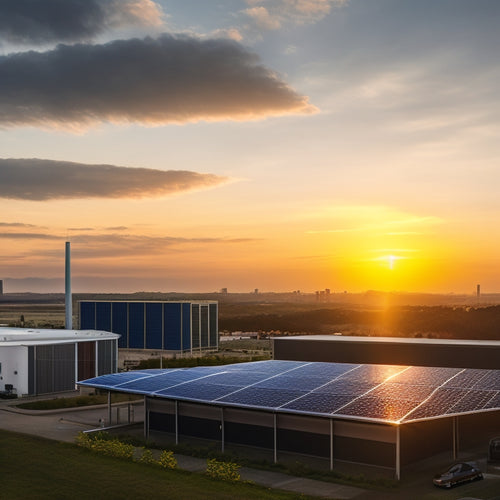
5 Best Solar Energy Systems for Homeowners
Share
You're looking for the best solar energy systems for your home, taking into account top-rated residential solar panels with high-efficiency designs from brands like Tesla and LG. To maximize energy output, you'll also need to pair them with the best solar inverters, such as hybrid or microinverters, ensuring compatibility with your local electrical grid. In addition, solar battery systems like those from Tesla and Sonnen can provide reliable energy storage. Moreover, exploring affordable installation options, including DIY and financing alternatives, can help you find a budget-friendly solution. As you weigh your options, you'll want to evaluate the details that will make your solar energy system a success.
Key Takeaways
- High-efficiency solar panels from top brands like Tesla and Panasonic ensure maximum energy output and durability.
- Energy-efficient upgrades to insulation, windows, and doors can optimize energy savings before installing solar energy systems.
- Hybrid solar inverters with energy storage capabilities and high efficiency ratings are ideal for homeowners seeking reliable power supply.
- Solar battery systems with high depth of discharge and compatible with existing setups ensure maximum energy storage and reliability.
- Affordable installation options, including financing alternatives and government incentives, can make solar energy systems accessible to homeowners on a budget.
Top-Rated Residential Solar Panels
When shopping for a solar energy system, you need high-quality residential solar panels that can efficiently convert sunlight into electricity.
Top-rated solar panel brands like Tesla, Panasonic, and LG offer high-efficiency panels that guarantee maximum energy output. Look for panels with a high power output per square foot and a durable design that can withstand harsh weather conditions.
Additionally, consider solar panel brands that offer installation incentives, such as discounts or rebates, to help offset the upfront cost of the system.
Energy Efficiency on a Budget
Five key considerations can help homeowners prioritize energy efficiency without breaking the bank.
You'll want to identify areas of energy waste, starting with your home's insulation, windows, and doors. Seal air leaks and add weatherstripping to prevent heat loss.
Next, upgrade to energy-efficient lighting and appliances, which can be budget-friendly if you look for rebates and discounts.
Consider a smart thermostat to optimize your heating and cooling usage.
Finally, conduct an energy audit to pinpoint areas for improvement.
Best Solar Inverters for Homes
You've decided to harness the power of solar energy for your home, and now it's time to choose the right inverter. This vital component converts DC power from your solar panels into AC power for your home.
When selecting an inverter, consider hybrid inverters, which can also charge a battery for energy storage. Microinverters, on the other hand, offer benefits such as individual panel monitoring and optimization. They're ideal for homes with partial shading or complex roofs.
Look for inverters with high efficiency ratings, reliable warranties, and certifications from organizations like UL and IEEE. Be certain to check the inverter's compatibility with your solar panel system and local electrical grid requirements.
Solar Battery Systems Compared
With your solar panel system and inverter in place, the next step is to contemplate energy storage solutions.
You'll want to choose a solar battery system that's compatible with your existing setup. Look for batteries with a high depth of discharge (DOD) to maximize energy storage.
Consider the type of battery chemistry, such as lithium-ion or lead-acid, and its impact on performance and lifespan. System compatibility is vital, so verify the battery system integrates seamlessly with your inverter and panel system.
Top brands like Tesla, LG, and Sonnen offer reliable battery storage solutions. Research each option carefully to find the best fit for your energy needs and budget.
Affordable Installation Options
Considering the significant upfront costs of a solar energy system, it's essential to investigate affordable installation options that won't break the bank.
You may consider DIY solar installation, but be aware that it requires technical knowledge and may void your system's warranty. A safer and more convenient option is to examine financing alternatives.
Many solar panel manufacturers and installers offer financing options, such as loans or power purchase agreements, that can help spread the cost over time. These options often come with little to no upfront costs, making solar energy more accessible to homeowners.
Additionally, you may be eligible for government incentives and tax credits that can further reduce the overall cost of your solar energy system.
Frequently Asked Questions
How Long Does It Take to Install a Residential Solar Energy System?
You'll be surprised to know that 80% of homeowners switch to solar within a year of learning about it! As you consider making the switch, you're probably wondering how long it takes to install a residential solar energy system - typically, the installation timeline spans 2-5 days, depending on the complexity of the installation process.
Can I Install Solar Panels on a Metal Roof?
When considering solar panel installation, you'll need to assess your metal roof's compatibility; verify it's structurally sound and free of obstacles, then choose a suitable mounting system, factoring in installation considerations for various roof types.
Are Solar Energy Systems Resistant to Hail and Extreme Weather?
"When it rains, it pours," but you can rest assured that solar energy systems are designed to weather the storm, literally. They're built to withstand hail damage and boast impressive weather resilience, ensuring your system stays online even in extreme conditions.
Do Solar Panels Work During Power Outages?
During power outages, you'll find that standard solar panels don't provide electricity since they're grid-tied, guaranteeing your safety. However, you can investigate power outage solutions, such as battery backup systems, to maintain solar panel functionality and assure a reliable energy supply.
Can I Sell Excess Energy Back to the Utility Company?
You can sell excess energy back to the utility company through net metering benefits, which allow you to offset your energy consumption, or participate in energy buyback programs, ensuring a safe and efficient way to monetize your renewable energy production.
Related Posts
-

What Happens Without a Charge Controller in Solar Panels
Without a charge controller in your solar panel system, you risk overheating batteries due to overcharging, which can...
-

Key Components of a Reliable Emergency Power Supply System
A reliable emergency power supply system requires several key components. You need proven performance metrics to guar...
-

Advantages of Commercial Solar Battery On-Site Storage
By investing in a commercial solar battery on-site storage system, you can greatly reduce your energy grid dependence...


